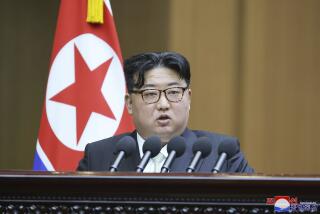Dispute Over Opera Dooms Plan for Reunion of Korean Families : South Korea: Cancellation deals another setback to the policy of President Roh Tae Woo.
- Share via
SEOUL — A plan for a reunion of Koreans separated by war and partition was rejected Monday.
At a meeting in Panmunjom, in the demilitarized zone, the North Koreans insisted that Communist artists be permitted to put on four performances of a propaganda opera at the reunion planned for Dec. 8-11. All four performances were to be shown on South Korean television. South Korea’s chief Red Cross representative, Song Yong Dae, rejected the demand. He said the opera, “Flower Maiden,” glorifies revolution and “would hamper rapprochement between the South and North.”
The opera describes North Korean President Kim Il Sung’s struggle against Japanese colonial rule, which lasted for 35 years until the end of World War II in 1945 and the partition of Korea.
The two sides agreed last Tuesday that performances by entertainers taking part in the reunion would be televised in both countries. But when North Korea demanded that it be allowed to stage “Flower Maiden,” Song condemned it for putting propaganda above the reunion of Koreans who in most cases have not seen or communicated with each other since the 1951-53 Korean War.
Only once before, in 1985, was a reunion of separated relatives permitted, and only 100 people were involved, 50 from the North and 50 from the South.
Monday’s stalemate was considered particularly disappointing because all other details had been worked out. The North was to send 250 people to Seoul, and the South was to send 300 to Pyongyang.
In addition to dashing hopes for the reunion, the falling-out doomed an agreement for talks on regular visits back and forth across the heavily fortified zone that separates the two countries. These talks were scheduled to get under way Dec. 15 in Pyongyang.
The collapse served to underscore the continuing failure of South Korean President Roh Tae Woo to achieve the ultimate goal of his so-called nordpolitik , or northern diplomacy. Nordpolitik is aimed at improving relations with Communist governments so as to persuade North Korea to accept a peaceful interchange with the south. Ironically, the policy has proved a spectacular success nearly everywhere else.
Only last week, Roh celebrated the greatest triumph of the process by visiting Hungary, becoming the first South Korean president ever to set foot in a socialist country. Earlier this year, Hungary and Poland established full diplomatic relations with South Korea, the first Communist states to do so.
Since Roh first enunciated the policy, in the presidential election campaign of 1987, South Korea’s relations and trade with the Soviet Union, China and several East European countries have expanded dramatically.
More to Read
Sign up for Essential California
The most important California stories and recommendations in your inbox every morning.
You may occasionally receive promotional content from the Los Angeles Times.













